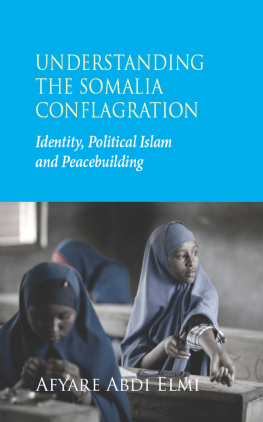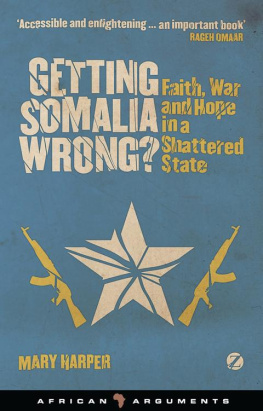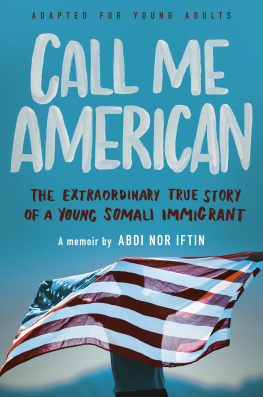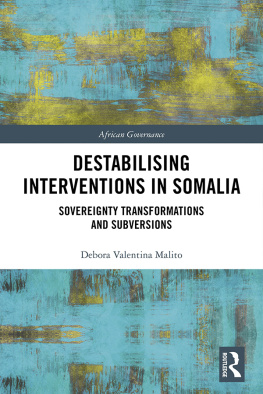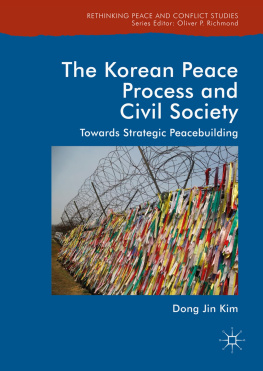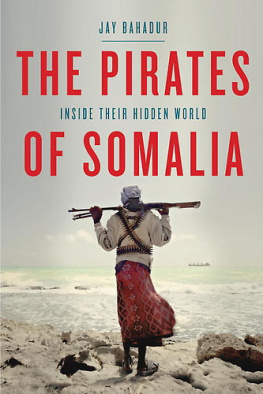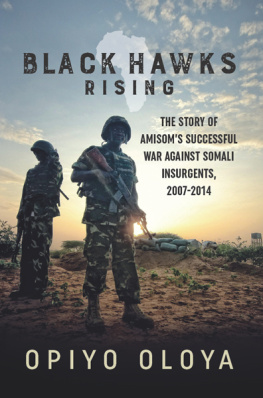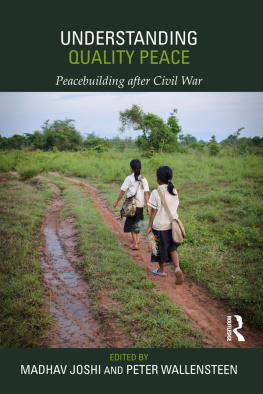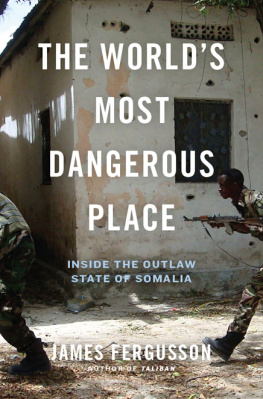First published 2010 by Pluto Press
345 Archway Road, London N6 5AA
www.plutobooks.com
Pambazuka Press
51 Cornmarket Street
Oxford
OX1 3HA
www.pambazukapress.org
Distributed in the United States of America exclusively by
Palgrave Macmillan, a division of St. Martins Press LLC,
175 Fifth Avenue, New York, NY 10010
Distributed in Africa exclusively by Pambazuka Press
Copyright Afyare Abdi Elmi 2010
The right of Afyare Abdi Elmi to be identified as the author of this work has been
asserted by him in accordance with the Copyright, Designs and Patents Act 1988.
British Library Cataloguing in Publication Data
A catalogue record for this book is available from the British Library
ISBN 978 0 7453 2975 8 Hardback
ISBN 978 0 7453 2974 1 Paperback (Pluto Press)
ISBN 978 1 906387 76 1 Paperback (Pambazuka Press)
ISBN 978 1 849645 54 6 PDF eBook
ISBN 978 1 783713 63 9 Kindle eBook
ISBN 978 1 783713 62 2 EPUB eBook
Library of Congress Cataloging in Publication Data applied for
This book is printed on paper suitable for recycling and made from fully managed and sustained forest sources. Logging, pulping and manufacturing processes are expected to conform to the environmental standards of the country of origin.
10 9 8 7 6 5 4 3 2
Designed and produced for Pluto Press by
Chase Publishing Services Ltd, Sidmouth, England
Typeset from disk by Stanford DTP Services, Northampton, England
Simultaneously printed digitally by CPI Antony Rowe, Chippenham, UK and
Edwards Bros in the United States of America
This book is dedicated to the hundreds of thousands of Somalis who perished during Somalias brutal civil war and the subsequent Ethiopian occupation. I also dedicate this book to the aspirations of the millions of Somalis who are striving and struggling to establish a peaceful and prosperous Somalia.
Markay dani meeday tidhi
Maxaan talo meel ka deyey,
Markay dani maaha tidhi
Weyddiiyey qof meel ka deyey,
Markay dani maaha tidhi
Ku laabtay halkaan ka deyey,
Markay dani maaha tidhi
Ka sii deyey meel la-deyey.
When a need arose,
I searched for a solution
When that solution did not work
I asked someone who also tried to resolve
the problem
When that solution did not work [again]
I looked again in the same place I searched
before for the solution
When that solution did not work for me
I searched again in a place that has already
been looked [by someone else] for a solution.*
Mohamed I. Warsame (Hadrawi), Dabahuwan
| * | These are the first lines of Dabahuwan (Covered from the bottom), which Hadrawi composed in 1995. In the poem, Hadrawi asserts that those who are trying to resolve the Somali problems are searching for solutions in the wrong places. In this first stanza, he argues that the imported foreign mechanisms that are used cannot address the Somali problem at all. |
Acknowledgements
Completing a book project requires the efforts of more than one person. My case was no exception, and I benefited from many people while researching and writing this publication. I would like to thank Dr W. Andy Knight and Dr Terrance Carson, who supervised my PhD thesis. Without their guidance, help and understanding, I would not have produced this book. I am also grateful to the members of my dissertation committee, Dr Ali A. Abdi, Dr Yasmeen Abu-Laban and Dr Tom Keating, for their support and encouragement.
Many of my friends were able to discuss the project and provide feedback over the past three years. Special thanks go to Said Mohamud Mohamed (Said Suugaan) and Dr Abdullahi Ahmed Barise. I spent many hours debating with Said on the findings and contentious points. Said also read most of the chapters and critiqued my arguments and assertions. Moreover, I thank Said for allowing me to use his library, as he has a large collection of books, reports and electronic resources on Somalia and East Africa. Similarly, Dr Barises comments helped me clarify my arguments. In addition, I am grateful to Katie Lehman, who read the manuscript several times to edit and format the book. The discussions that I had with Abdulrahman Aynte, Ali Weheliye, Mohamed Duale, Abdirashid Khalif, Hassan Mahadalla, Mohamud Khalif, Awalle Abdi, Mohamed Elmi, Abdullahi Sheikh Aden, Zainab Hassan, Sahal Abdulle, Hussein Santur, Yusuf Hassan and Ladan Affi helped me clarify arguments, and I would like to thank them for their support and invaluable advice.
Many more people helped me to complete this book. Among them are those whom I interviewed, Somalis and non-Somali individuals. During my two field research trips to Somalia, Kenya, Djibouti, Eritrea, Qatar and United Arab Emirates, I met and discussed the issues in this book with many Somalis. Their information, analysis and thoughts enriched and strengthened this study, and I would like to thank all of them.
Moreover, since I joined the University of Alberta, I benefited from the institutional resources of the university. As a student, I completed courses that directly and indirectly contributed to this publication. I am grateful to my teachers: Dr W. Andy Knight, Dr Terrance Carson, Dr Tom Keating, Dr Fred Judson, Dr Jenine Brodie, Dr George Richardson, Dr Malinda Smith, Dr Dianne Conrad and Dr David Smith. While at the University of Alberta, I taught several courses including Theories of International Relations, Introduction to Political Science, and Conflict and Peacebuilding. More than 150 students took this last course and critiqued some of my views. I am grateful to all of them. I also taught similar courses at the Qatar Universitys International Affairs Department, where students discussion and critique was useful to me I thank them as well.
I am also grateful to Dr Lois Harder, Coordinator of the Graduate Program of the Department of Political Science at the University of Alberta, for her understanding, advice and support. The administration staff of the Political Science and Secondary Education departments have always addressed my questions and have made my stay at the university enjoyable. I thank Tara Mish, Marilyn Calvert, Cindy Anderson, Donna Coombs-Montrose, Dawne Cook, Donna Lauritsen, Kateryna Nowytzkyj, Vanessa Ianson and Nancy Evans.
Most important of all, I would like to thank my wife, Sahro Ali Ebar, and my children, Mohamed, Maryama, Faizo and Abdulrahman, who not only understood the long hours I spent away from home but always supported me. Without their understanding, commitment and sustained support, this project would not have come to fruition.
With respect to funding, I am grateful to the International Development Research Centre in Ottawa, as it provided a grant that helped me to carry out this research. Information on the Centre is available at www.idrc.ca. I also appreciate the grants and scholarships I received from the University of Alberta in order to complete this research project.

